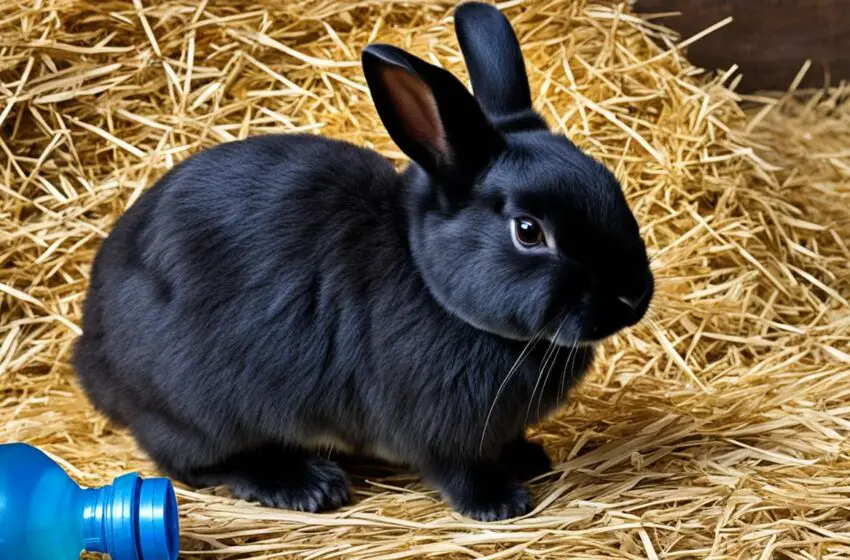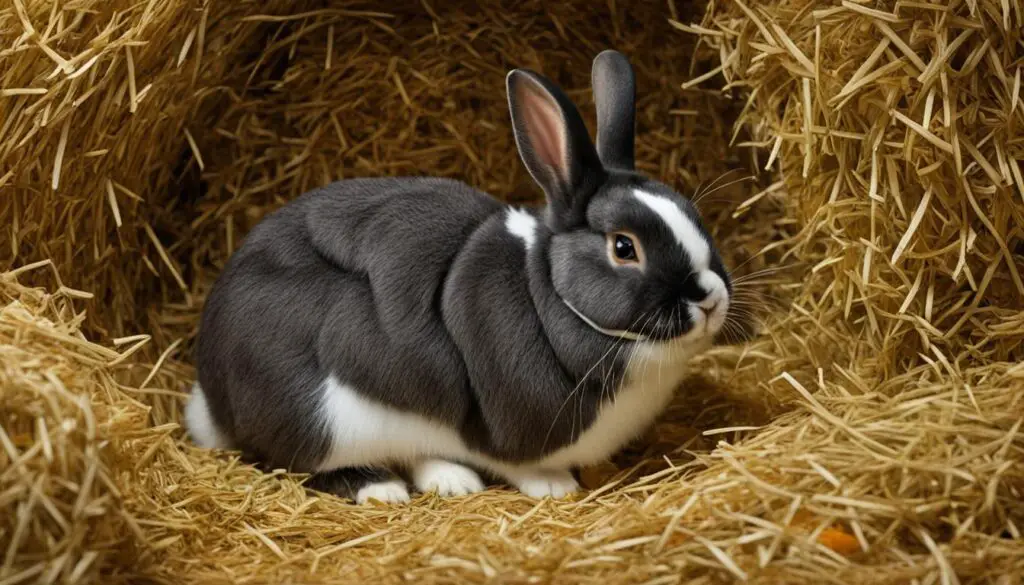Identifying and Managing Common Health Issues in Dwarf Rabbits

I am excited to share some valuable insights on identifying and managing common health issues in dwarf rabbits. As a rabbit owner, it is essential to be aware of these health concerns and take preventive measures to ensure our furry friends live a happy and healthy life.
Dwarf rabbits, like any other pets, can encounter health problems that require our attention. By understanding the common health issues specific to dwarf rabbits and taking proactive steps, we can provide them with the care they need to thrive.
Throughout this article, we will explore various health issues that dwarf rabbits may face, including dental problems, gastrointestinal stasis, respiratory infections, parasites, and urinary tract problems. By familiarizing ourselves with these issues, we can better recognize the symptoms and take appropriate action.
Let’s dive into each of these health topics in detail, discussing how to identify the issues, manage them effectively, and prevent future problems. By staying proactive and informed, we can ensure the well-being of our dwarf rabbits.
Key Takeaways:
- Understanding common health issues in dwarf rabbits is vital for effective management and prevention.
- Dental problems, gastrointestinal stasis, respiratory infections, parasites, and urinary tract problems are some common health concerns in dwarf rabbits.
- Regular veterinary care, a balanced diet, exercise, and a clean living environment are essential for maintaining the health of dwarf rabbits.
- Early identification and prompt treatment of health issues can prevent complications and improve the well-being of dwarf rabbits.
- By taking preventive measures, such as providing appropriate chew toys and ensuring proper dental care, we can reduce the risk of common health problems.
Dental Problems in Dwarf Rabbits
Dental problems are common in dwarf rabbits due to their continuously growing teeth. If their teeth are not properly aligned or trimmed, it can lead to dental malocclusion, overgrowth, or sharp spikes. These issues can cause pain, difficulty in eating, and even abscesses.
Regular dental check-ups and providing appropriate chew toys can help prevent and manage dental problems in dwarf rabbits.
Importance of Dental Care in Dwarf Rabbits
Dwarf rabbits have unique dental needs due to their small size and continuously growing teeth. It is essential to provide them with proper dental care to prevent dental problems and ensure their overall health and well-being.
“Proper dental care is crucial for dwarf rabbits to avoid dental issues that can cause pain and discomfort.”
Identifying Dental Problems in Dwarf Rabbits
It is important for rabbit owners to be aware of the signs and symptoms of dental problems in their dwarf rabbits. Some common signs include:
- Loss of appetite
- Difficulty in eating or dropping food
- Excessive drooling or saliva build-up
- Weight loss
- Facial swelling or abscesses
If you notice any of these signs, it is important to consult a veterinarian who specializes in exotic pets, such as rabbits.
Preventing Dental Problems in Dwarf Rabbits
Preventing dental problems in dwarf rabbits starts with providing a proper diet. A good quality hay should be the staple of their diet, as it helps wear down the teeth naturally. Additionally, offering a variety of fresh vegetables and a small amount of pellets can contribute to a balanced diet.
Chew toys made of safe materials, such as untreated wood or apple branches, can also help keep the rabbit’s teeth trim and healthy. These toys provide the necessary chewing action that helps prevent dental issues.
Managing Dental Problems in Dwarf Rabbits
If dental problems are detected in a dwarf rabbit, it is crucial to seek veterinary care as soon as possible. The veterinarian may perform a dental examination, including x-rays if necessary, to determine the extent of the issue.
Treatment options may include dental filing or trimming to correct alignment issues or remove overgrown or sharp teeth. In severe cases, surgical intervention may be required.
Gastrointestinal Stasis
Gastrointestinal stasis, also known as GI stasis, is a serious health issue in dwarf rabbits. It occurs when a rabbit’s digestive system slows down or stops functioning properly. Common causes of gastrointestinal stasis include a diet low in fiber, stress, lack of exercise, or the formation of hairballs in the digestive tract.
When a rabbit experiences gastrointestinal stasis, its digestive system fails to move food through the gastrointestinal tract effectively. This can lead to a range of symptoms, including a loss of appetite, decreased fecal output, and a hunched posture. If left untreated, GI stasis can have severe consequences for a rabbit’s health and well-being.
To prevent and manage gastrointestinal stasis in dwarf rabbits, it is crucial to seek prompt veterinary care. A veterinarian will be able to diagnose the condition and provide appropriate treatment options. Additionally, ensuring a balanced diet that is high in fiber is essential for promoting healthy digestion in rabbits. Regular exercise is also important as it helps stimulate the digestive system and prevent stasis.
Furthermore, providing a suitable environment that minimizes stress can help prevent gastrointestinal stasis in dwarf rabbits. Stressors such as loud noises, sudden changes in routine, or inadequate living conditions can disrupt their digestive process. Creating a calm and comfortable environment for your rabbit will contribute to a healthy digestive system.
| Preventive Measures for Gastrointestinal Stasis | Management Strategies for Gastrointestinal Stasis |
|---|---|
|
|
By being aware of the potential for gastrointestinal stasis and taking preventive measures, dwarf rabbit owners can help ensure their pets’ digestive health. Swift action and proper management, in collaboration with veterinary guidance, are crucial for preventing and treating GI stasis in these small and delicate animals.

Respiratory Infections
Dwarf rabbits, like any other animals, are vulnerable to respiratory infections. These infections can be caused by various factors, including bacteria, viruses, poor ventilation, or stress. It is essential for dwarf rabbit owners to be aware of the signs and symptoms of respiratory infections to ensure prompt veterinary care.
Common symptoms of respiratory infections in dwarf rabbits include:
- Sneezing: Excessive or frequent sneezing is a common sign of a respiratory infection. Pay attention to any unusual sneezing patterns in your rabbit.
- Nasal Discharge: If you notice discharge from your rabbit’s nose, such as mucus or pus, it may indicate a respiratory infection.
- Difficulty Breathing: Respiratory infections can cause breathing difficulties, such as wheezing or rapid breathing. Observe your rabbit’s breathing patterns and seek veterinary help if you notice any abnormalities.
- Lethargy: A rabbit with a respiratory infection may become lethargic and show a lack of energy or interest in activities.
Timely veterinary treatment is crucial in managing respiratory infections in dwarf rabbits. A veterinarian will assess your rabbit’s symptoms and provide appropriate treatment options, such as antibiotics or supportive care.
Preventing respiratory infections in dwarf rabbits involves maintaining a clean living environment and proper ventilation. Regularly clean your rabbit’s habitat to minimize the presence of bacteria or viruses. Avoid exposing your rabbit to extreme temperature changes or drafts, as these can weaken their respiratory system.

Remember, a healthy respiratory system is vital for the overall well-being of your dwarf rabbit. If you suspect any respiratory issues, seek veterinary attention promptly to ensure your furry friend stays happy and healthy.
Parasites in Dwarf Rabbits
Dwarf rabbits are susceptible to both external and internal parasites, which can have detrimental effects on their health and well-being. These parasites include fleas, mites, ticks, and worms.
External parasites like fleas, mites, and ticks can cause itching, skin irritations, and hair loss in dwarf rabbits. They can also transmit diseases and lead to secondary infections. It is important to regularly groom your rabbit and conduct thorough checks for any signs of external parasites. If infestations are detected, consult with a veterinarian for appropriate treatment options.
Internal parasites, such as worms, can affect the gastrointestinal system of dwarf rabbits. Common types of worms that may infest rabbits include roundworms, tapeworms, and pinworms. These parasites can cause weight loss, diarrhea, and other digestive issues. Regular veterinary check-ups and fecal exams are crucial to detect and treat internal parasites early on.
“Parasites can cause itching, skin irritations, weight loss, and other health issues in dwarf rabbits.”
Prevention plays a key role in managing parasites in dwarf rabbits. Keeping their living environment clean and practicing good hygiene can help minimize the risk of infestations. Additionally, providing a balanced diet and maintaining regular veterinary care ensures that any potential parasite issues are addressed promptly.
Common Parasites in Dwarf Rabbits
| Parasite Type | Examples |
|---|---|
| External Parasites | Fleas, mites, ticks |
| Internal Parasites | Roundworms, tapeworms, pinworms |
Urinary Tract Problems
Urinary tract problems, such as urinary tract infections or bladder stones, are common issues that can affect dwarf rabbits and impact their overall health. These conditions can cause discomfort, pain, and in severe cases, urinary blockages that can be life-threatening if not promptly addressed.
To prevent urinary tract problems in dwarf rabbits, it is crucial to provide them with a balanced diet that promotes urinary health. This includes feeding them a diet rich in fiber, which can help prevent the formation of bladder stones and maintain normal urine pH levels. Fresh water should also be readily available at all times to ensure proper hydration.
Regular exercise plays a vital role in preventing urinary tract problems as well. Encouraging physical activity, such as supervised playtime and providing ample opportunities for movement, can help stimulate the rabbit’s urinary system and prevent stasis.
Timely veterinary care is essential for the diagnosis and treatment of urinary tract problems in dwarf rabbits. If any signs of discomfort or abnormal urination patterns are observed, it is important to consult a veterinarian for a thorough examination. Diagnostic tests, such as urine analysis and imaging, may be necessary to determine the underlying cause and develop an appropriate treatment plan.
By taking preventive measures and seeking timely veterinary care, rabbit owners can help maintain the health and well-being of their dwarf rabbits, ensuring a happy and comfortable life.
| Preventive Measures | Treatment Options |
|---|---|
|
|
Conclusion
Managing the common health issues that dwarf rabbits may encounter is essential for their overall well-being. By staying informed about these health concerns, implementing preventive measures, and seeking veterinary care when necessary, rabbit owners can ensure their furry companions lead healthy and happy lives.
Providing a balanced diet is crucial for dwarf rabbits, as it helps maintain their overall health. Additionally, regular exercise is essential to promote proper digestion and prevent obesity. Creating a clean living environment plays a significant role in preventing the spread of diseases and maintaining good hygiene for your rabbit.
Remember, early identification and timely intervention are key to managing common health issues in dwarf rabbits. Regular veterinary check-ups, including dental examinations and vaccinations, can help catch any potential problems before they become more serious. By being proactive and attentive to their needs, you can help your dwarf rabbit live a long, vibrant life.
FAQ
What are some common health issues in dwarf rabbits?
Common health issues in dwarf rabbits include dental problems, gastrointestinal stasis, respiratory infections, parasites, and urinary tract problems.
What are dental problems in dwarf rabbits?
Dental problems in dwarf rabbits occur due to their continuously growing teeth. If their teeth are not properly aligned or trimmed, it can lead to dental malocclusion, overgrowth, or sharp spikes, causing pain, difficulty in eating, and abscesses.
What is gastrointestinal stasis in dwarf rabbits?
Gastrointestinal stasis, also known as GI stasis, is a serious health issue in dwarf rabbits. It occurs when a rabbit’s digestive system slows down or stops functioning properly, usually due to a diet low in fiber, stress, lack of exercise, or hairballs.
What are respiratory infections in dwarf rabbits?
Respiratory infections in dwarf rabbits can be caused by bacteria, viruses, or other factors like poor ventilation or stress. Symptoms may include sneezing, nasal discharge, difficulty breathing, and lethargy.
What are parasites in dwarf rabbits?
Parasites in dwarf rabbits can be external (fleas, mites, ticks) or internal (worms). These parasites can cause itching, skin irritations, weight loss, and other health issues.
What are urinary tract problems in dwarf rabbits?
Urinary tract problems in dwarf rabbits include urinary tract infections or bladder stones, which can cause pain, discomfort, and urinary blockages.
How can I prevent and manage common health issues in dwarf rabbits?
Preventing and managing common health issues in dwarf rabbits include regular dental check-ups, providing appropriate chew toys for dental problems, a balanced diet, regular exercise, proper ventilation, cleanliness, routine grooming, and timely veterinary care.



